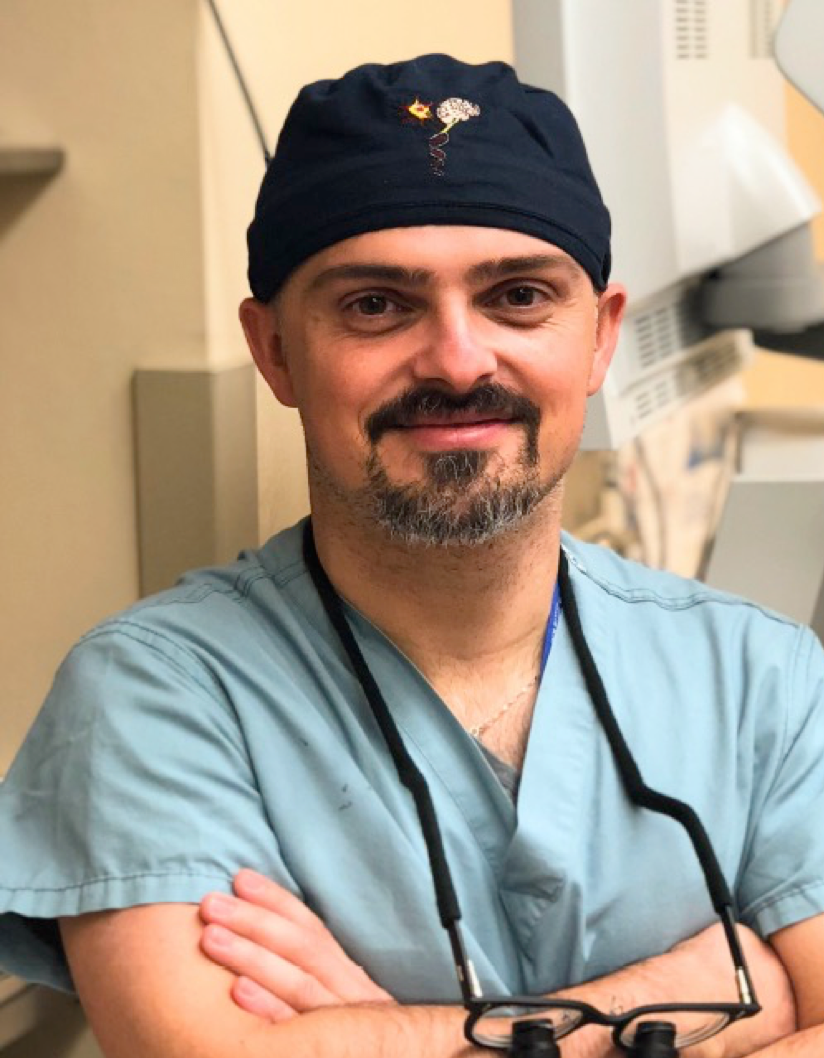Stefano M. Priola1, Jin Ye Yeo2
1Department of Surgery, Division of Neurosurgery, Northern Ontario School of Medicine University, Health Sciences North, Sudbury, ON, Canada; 2ASJ Editorial Office, AME Publishing Company
Correspondence to: Jin Ye Yeo. ASJ Editorial Office, AME Publishing Company. Email: asj@amegroups.com
This interview can be cited as: Priola SM, Yeo JY. Meeting the Editorial Board Member of ASJ: Dr. Stefano M. Priola. AME Surg J. 2025. Available from: https://asj.amegroups.org/post/view/meeting-the-editorial-board-member-of-asj-dr-stefano-m-priola.
Expert introduction
Dr. Stefano M. Priola (Figure 1) is an Assistant Professor in Neurosurgery at the Northern Ontario School of Medicine University, Sudbury (ON), Canada. He received his medical degree and completed his Residency in Neurosurgery at the University of Messina, Italy. He has completed a 1-year Clinical Fellowship in Neuro-oncology and Skull Base Surgery, at the Toronto Western Hospital, University of Toronto, Toronto (ON), Canada, a 2-year Clinical Fellowship in General Neurosurgery and a 1-year Clinical Fellowship in Open Vascular and Endovascular Neurosurgery, at the Sunnybrook Health Science Center, University of Toronto, Toronto (ON), Canada. His clinical research activities focus on neuro-oncology and neuroendovascular surgery, and he has more than fifty peer-reviewed publications.
Dr. Priola is a member of many Scientific Societies, including the Italian Society of Neurosurgery, the Canadian Neurosurgical Society, the World Stroke Organization, the Congress of Neurological Surgeons, and the Canadian Spine Society.

Figure 1 Dr. Stefano M. Priola
Interview
ASJ: What inspired you to pursue a career in neurosurgery, particularly in neuro-oncology and neuro-endovascular surgery?
Dr. Priola: My fascination with the brain began in medical school, where I realized my passion for both surgery and the complexities of neurological functions. Neurosurgery presents unique challenges that require a blend of surgical skills, strategic planning, and an opportunity for impactful research in areas like tumor biology and surgical techniques.
ASJ: What are some of the most exciting developments in the fields of neuro-oncology and neuro-endovascular surgery today? Are there any emerging technologies or techniques that stand out to you?
Dr. Priola: Numerous advancements are transforming neuro-oncology and neuro-endovascular surgery. Notably, the shift toward targeted therapies using genetic profiling allows for personalized treatment options for gliomas, such as IDH1/2 inhibitors. Immunotherapy, including checkpoint inhibitors and CAR T-cell therapy, is also gaining traction, with promising results in clinical trials.
Advancements in imaging technologies like MRI-PET (magnetic resonance imaging combined with positron emission tomography) and diffusion tensor imaging have improved our ability to assess tumors and their responses to therapies. In neuro-endovascular surgery, techniques like stent-assisted coiling and flow diversion have revolutionized the management of cerebral aneurysms and arteriovenous malformations. Robotic surgery is on the rise, providing enhanced precision and potentially lower complication rates. These developments reflect a trend towards less invasive procedures and improved patient outcomes.
ASJ: What areas of neurosurgical research do you believe require more attention in the coming years?
Dr. Priola: Personalized medicine is a crucial area that needs more research, focusing on tailored surgical approaches based on genetic and molecular profiles, particularly for brain tumors and epilepsy. Additionally, exploring techniques for nerve tissue regeneration, such as stem cell therapy and biomaterials, is vital for treating nervous system injuries. Lastly, innovations in neuroimaging can enhance diagnostic accuracy and surgical planning, warranting further research.
ASJ: How do you see the future of neurosurgery evolving in terms of multidisciplinary collaboration, particularly in relation to artificial intelligence (AI)?
Dr. Priola: The integration of artificial intelligence in neurosurgery will be transformative. AI can enhance diagnostic accuracy in medical imaging, allowing for better preoperative planning. Collaborative engineering and computing innovations will lead to robotic assistance, improving surgical precision and safety.
Moreover, predictive analytics via AI can optimize patient data analysis, refining surgical outcomes and patient selection. As AI tools become integral to our field, interdisciplinary training will become essential, shaping a new generation of neurosurgeons adept in both surgical and technological domains. Telemedicine and remote collaborations will expand access to specialized care, and multidisciplinary teams will develop comprehensive treatment plans that prioritize patient-centered care.
ASJ: As an Assistant Professor at NOSM University, what aspects of mentoring and teaching neurosurgical trainees do you find most fulfilling?
Dr. Priola: Mentoring neurosurgical trainees is immensely rewarding. As mentors, we play a vital role in shaping the next generation, instilling essential skills and confidence. Creating a supportive environment encourages questions and fosters professional growth. Witnessing trainees develop from novices to skilled surgeons is particularly fulfilling, directly impacting patient outcomes through effective training.
ASJ: What advice would you give to young neurosurgeons interested in specializing in neuro-oncology or vascular neurosurgery?
Dr. Priola: My advice for aspiring neurosurgeons is to build a strong foundation in general neurosurgery. The next step would be a residency programs that offer specialized opportunities in neuro-oncology and vascular surgery. Finding mentors in these fields is crucial as they can provide guidance and research opportunities. Networking through conferences and workshops is essential for staying informed and establishing professional connections.
Collaboration with other specialists is key, so developing strong relationships with oncologists and radiologists is important. Familiarity with advancements like minimally invasive techniques and robotic systems is becoming increasingly vital. Additionally, honing communication skills to understand and involve patients in their treatment is crucial for success. Finally, remain committed to lifelong learning, as the fields are constantly evolving.
ASJ: As an Editorial Board Member of ASJ, what are your expectations and aspirations for the journal?
Dr. Priola: My goal is to uphold rigorous peer review standards. Journals are essential resources for practitioners and scholars alike, and I aim to enhance their role in improving patient care.
